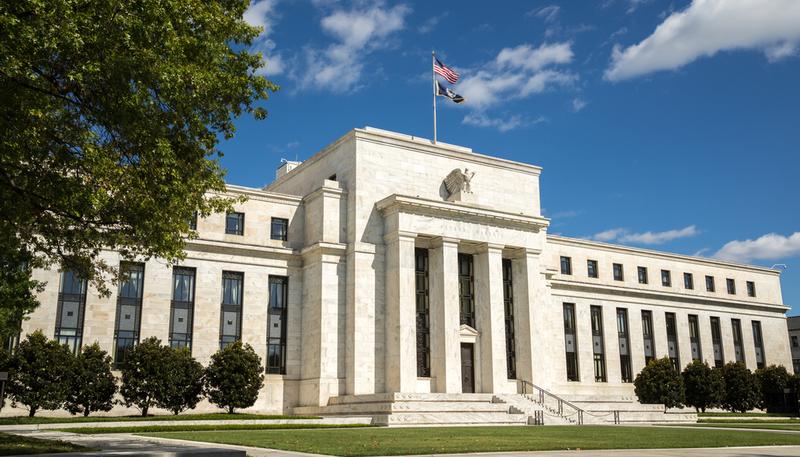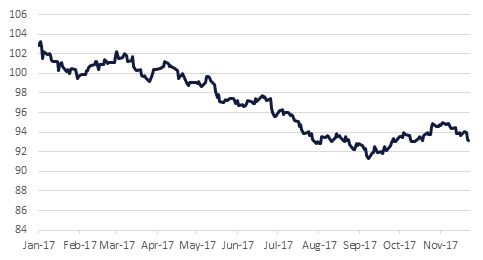
UK budget forecasters revised gross domestic product from 2.0% earlier, predicting GDP will grow by 1.5 percent in 2017 as the prospect of Brexit weighs on activity. Forecasters also cut GDP growth forecasts in 2019 and 2020 to 1.3 percent in both years, down from 1.7 and 1.9 percent previously. For 2021 and 2022, economic growth was still seen at 1.5 and 1.6 percent respectively. Chancellor Hammond provided a sizeable fiscal giveaway promising to abolish a property purchase tax for 80 percent of first-time home-buyers, maintain a freeze on fuel duty and spend more on the healthcare. This would push up the budget deficit to 1.3 percent of GDP in the 2021/22 financial year almost double the previous estimate.
Most Federal Reserve policymakers expect that interest rates will have to be raised in the ‘near term’ according to the minutes of the November FOMC meeting. Most Fed officials also agreed the economy was poised for strong growth, with some some seeing the the possibility that Congress will pass significant tax cuts as a potential boost to business investment. However some members who voted expressed concern over the inflation outlook, and are concerned enough about persistent weak inflation trends that they suggested the Fed consider a new framework allowing higher inflation to make up for periods of low prices. Such concerns over low inflation caused rates and the dollar to fall back, and supports our view that the Fed will raise rates only twice next year, against the three implied by the last ‘dot plot’.
MSCI is considering shifting calculations of Qatari stocks to the offshore riyal market, as investors complain that access to the onshore rate has become more difficult after the blocade. The statement released by MSCI, said it is consulting with investors on applying the WM/Reuters offshore spot rate to security prices and calculations of dividends. Furthermore the statement by MSCI pointed out that the consideration came after “the level of accessibility of the local currency for foreign institutional investors decreased significantly,”. The proposal could risk undermining the credibility of Qatar’s exchange rate regime, as the gap between onshore and offshore rates widen, currently standing at a differential of 7%.
 Source: Bloomberg, Emirates NBD Research
Source: Bloomberg, Emirates NBD Research
US treasuries pushed higher after the release of FOMC meeting minutes which were taken to be neutral to slightly dovish. UST yield curve shifted downwards with 2yr, 5yr and 10yr yields closing at 1.73% (-4bps), 2.04% (-6bps) and 2.32% (-4bps) respectively. Credit protection costs were also lower with CDS levels on US IG and Euro Main at 53bps and 49bps respectively.
Falling benchmark yields were somewhat counterbalanced by rising credit spreads, leaving the local GCC bonds only slightly up. Barclays GCC index closed with yields at 3.52% (-2bps) and OAS at 136bps (+2bps). However, rising oil prices boosted sentiment on GCC sovereign which recorded three to four bps tightening of 5yr CDS levels. CDS levels on KSA is now 89bps.
In corporate news, Bank of Sharjah is believed to be in talks to merge with Invest Bank and QTEL is believed to be interested in bidding for Turk telecom. BOSUH 22s closed with yield at 3.71%, 2bps lower and QTEL 23s closed with yield at 3.42%, again 2bps lower, though much of the movement in bond prices is attributed to benchmark yield curve tightening.
The dollar fell back further overnight as the Fed’s minutes from the November FOMC meeting cast renewed doubt on how much interest rates would be raised by next year. Although ‘nearly all participants’ affirmed a gradual approach to raising rates, which supports market expectations for a 25bp hike at the December meeting, the minutes showed concerns over low inflation, with worries that some of the softness could be due to more persistent factors, a concern also expressed by Janet Yellen earlier in the week. Such fears that low inflation might be becoming more persistent support our view that the Fed will raise rates only twice next year, against the three implied by the last ‘dot plot’.
Developed market equities closed marginally lower amid low volumes as investors took some money off the table ahead of the holiday. The S&P 500 index and the Euro Stoxx 600 index dropped -0.1% and -0.3% respectively.
It was a positive day of trading for regional equities following reports that some progress has been made on the corruption probe. The DFM index and the Tadawul added +1.0% and +0.7% each.
In terms of stocks, much of the focus remained on Emaar Development which started trading. The stock ended the day -4.3% lower. However the parent company, Emaar Properties, had a strong day with gains of +2.6%.
Oil prices rallied for a second consecutive trading session as US crude inventories dropped more than expected. According to EIA, crude stockpiles fell by 1.86mn barrels. Reports that ministers from OPEC countries and Russian Energy Minister are holding informal talks ahead of the formal meeting next meeting also helped prices.